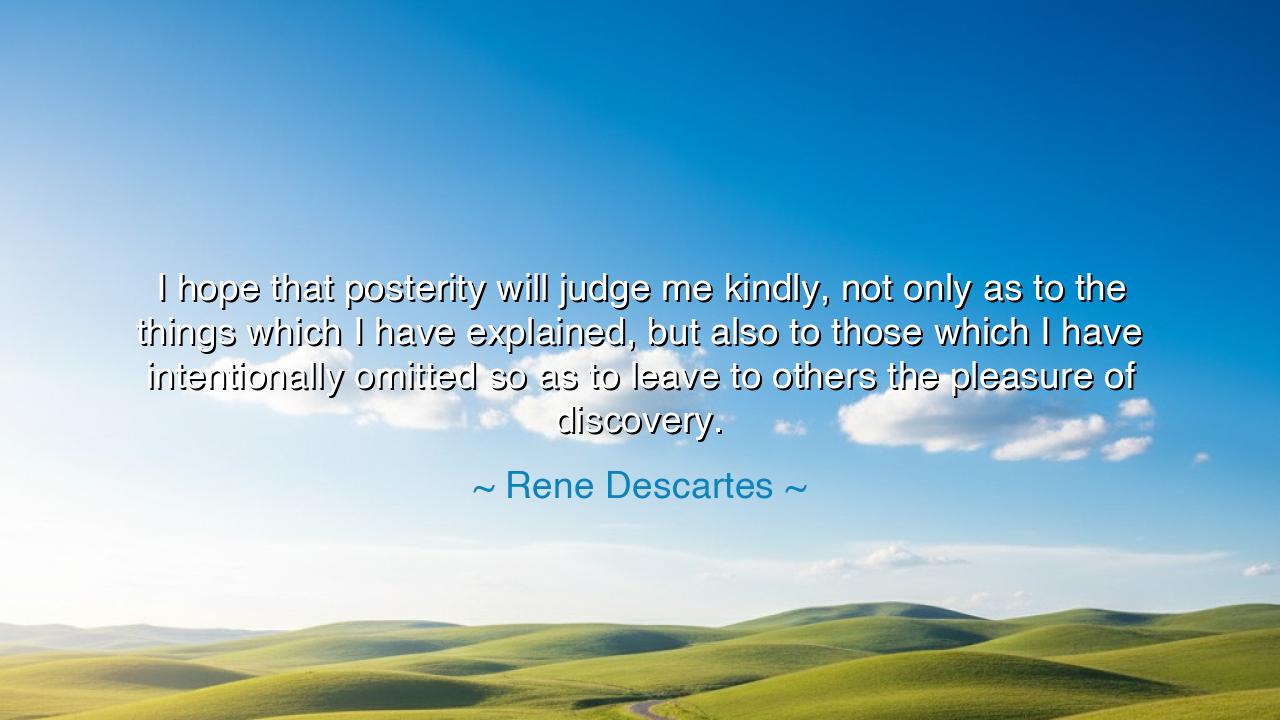
I hope that posterity will judge me kindly, not only as to the
I hope that posterity will judge me kindly, not only as to the things which I have explained, but also to those which I have intentionally omitted so as to leave to others the pleasure of discovery.






“I hope that posterity will judge me kindly, not only as to the things which I have explained, but also to those which I have intentionally omitted so as to leave to others the pleasure of discovery.” Thus wrote René Descartes, the philosopher of reason and the father of modern thought, whose mind sought not only truth, but the eternal unfolding of truth. In these words, he reveals the heart of a true thinker—one who understands that wisdom is not a possession to be hoarded, but a torch to be passed. His statement, both humble and profound, is a testament to intellectual generosity: the recognition that knowledge is a living river, meant to flow beyond the bounds of a single life.
The origin of this quote lies in Descartes’ lifelong labor to unite philosophy and science, to uncover a method by which human beings might reach certainty in a world clouded by doubt. He gave us Cogito, ergo sum—“I think, therefore I am”—a phrase that shattered old philosophies and gave birth to modern reasoning. Yet, for all his clarity, Descartes understood that no single man, however brilliant, could reveal the whole of truth. He left spaces unfilled, deliberate silences in his work, believing that future generations must have the joy and dignity of their own discoveries. His omissions were not failures—they were invitations.
In saying he hoped posterity would judge him kindly, Descartes speaks not from vanity, but from foresight. He knew that every thinker stands upon the shoulders of those who came before, and that his own shoulders must bear the weight of those who would come after. He saw knowledge as a ladder stretching through eternity—each rung built by the hands of many. By intentionally omitting certain explanations, he preserved the pleasure of discovery for others, granting to posterity the sacred right to wonder, to question, and to contribute. For what joy is there in a world where all mysteries are solved, where the flame of curiosity is extinguished?
The story of Descartes’ humility echoes in the lives of other great minds. Consider Isaac Newton, who famously said, “If I have seen further, it is by standing on the shoulders of giants.” Newton, who inherited the rational framework Descartes built, carried the work forward into physics, light, and motion. Yet even Newton, at the end of his days, confessed that he felt like a child “playing on the seashore, finding a smoother pebble here and there, while the great ocean of truth lay undiscovered before me.” Both men understood that knowledge is endless—that to seek it is to walk an infinite road. Descartes, in his mercy, left parts of that road untraveled, so that others could take the first steps into new light.
There is also in Descartes’ quote a profound moral lesson. It speaks to humility—the rare understanding that one’s greatness is magnified not by completing everything, but by enabling others to continue the work. The pleasure of discovery is among the highest gifts of the human spirit, and to deny others that joy would be to hoard the divine. Descartes’ restraint teaches us that true wisdom is not in saying all that can be said, but in knowing when to leave space—for reflection, for exploration, for the next generation’s imagination to bloom.
This principle extends beyond philosophy or science. In every field—in art, in leadership, in teaching, in creation—the greatest legacy is not domination, but continuation. The artist who inspires others to paint, the leader who trains successors to surpass him, the teacher who gives students the courage to think for themselves—these are the heirs of Descartes’ vision. For the world does not advance by the might of one mind alone, but by the joining of many minds across time. To act in such a way that others may discover, rather than merely inherit, is to participate in the endless renewal of truth.
So, my listener, take this teaching to heart: do not seek to be remembered for finishing everything—seek to be remembered for beginning something worthy of others to continue. Share what you know, but leave room for others to discover their own truths. Teach not only facts, but curiosity. Speak not to display knowledge, but to awaken wonder. For every answer you give, let there be a question left behind—an open door for those who follow you.
Thus, remember the wisdom of René Descartes: that knowledge is not a monument, but a garden, ever-growing, ever-changing. Sow seeds of understanding, but do not pluck every fruit. Let future generations find their own harvest. For in leaving behind mysteries yet unsolved, you give them the greatest gift of all—the pleasure of discovery, the joy of participating in the divine unfolding of truth itself.






AAdministratorAdministrator
Welcome, honored guests. Please leave a comment, we will respond soon